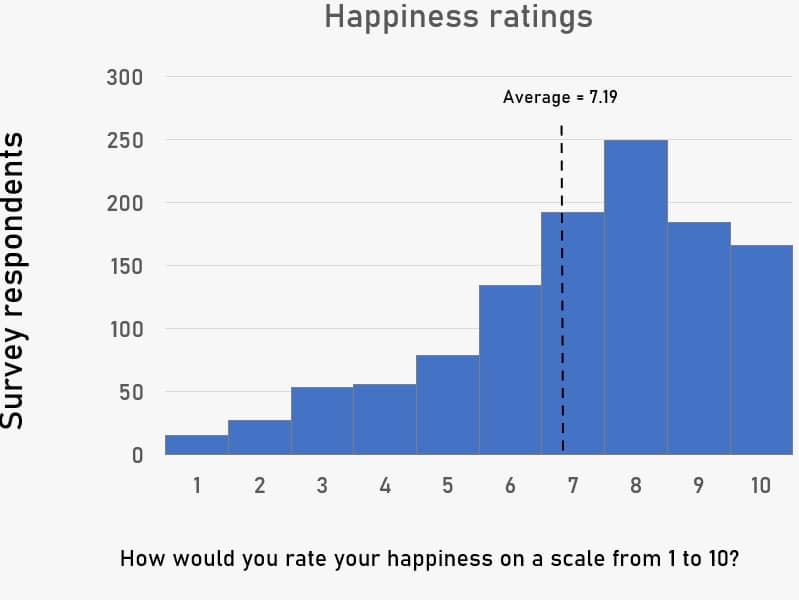We recently conducted a survey amongst the audience of Tracking Happiness (that’s you!)
Our goal?
To provide more objective data on topics that are often quoted throughout the internet.
Based on the results, we have come to multiple interesting conclusions, which are visualized and presented in separate articles.
This page contains general statistics of the survey, links to other specific study results, the methodology and a link to a PDF that summarizes the study.
Contents
Introduction
The aim of this large-scale study is to objectively compare data on happiness across different demographics and personality types. More specifically, this study aims to provide more objective data on topics that are often quoted throughout the internet.
For example, that 40% of our happiness is a result of our internal mindset.
Or that happiness is not something we can control.
This study is performed by the team of Tracking Happiness, by conducting a large-scale survey on the email subscribers of the website.
General survey statistics
Everybody knows that happiness is subjective. But how subjective is it really? How much sense does it make to measure something as subjective as happiness?
The survey aims to provide more objective data points on happiness. It goes without saying that the survey participants were asked how happy they were.
Happiness ratings amongst participants
One of the questions of the survey was:
If you look back at the last year of your life, how would you rate your happiness on a scale from 1 to 10?
Here is a histogram of the answers.
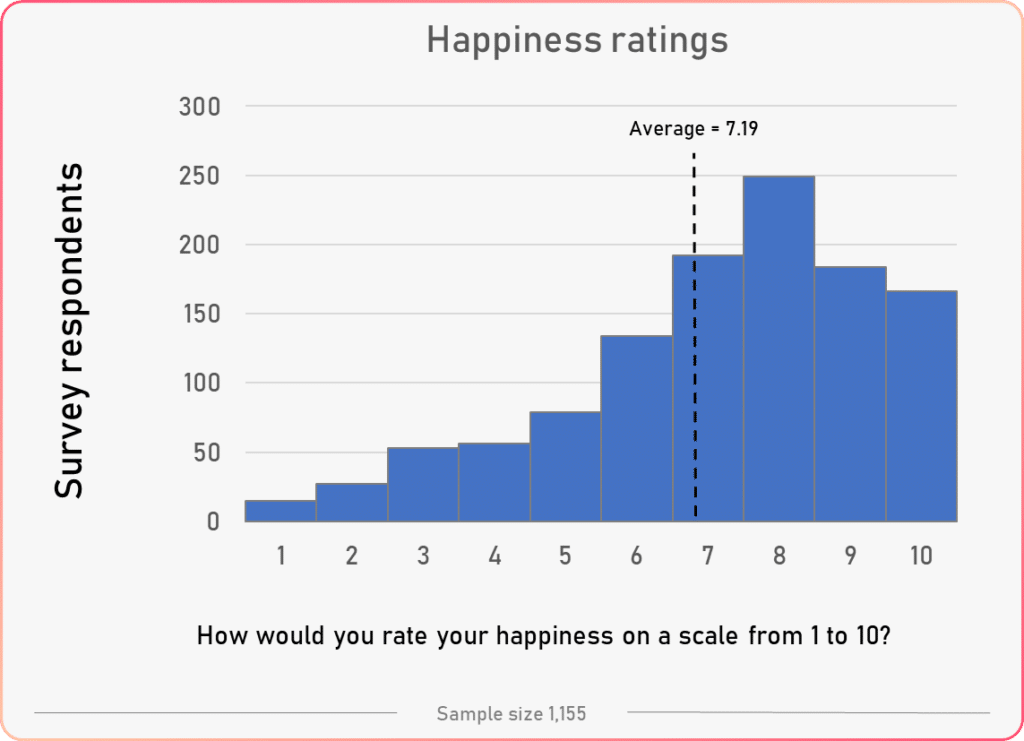
The average happiness rating amongst the survey participants was 7.19.
When compared to the World Happiness Report, this average is compared to the happiness of the 13th happiest country in the world: the United Kingdom.
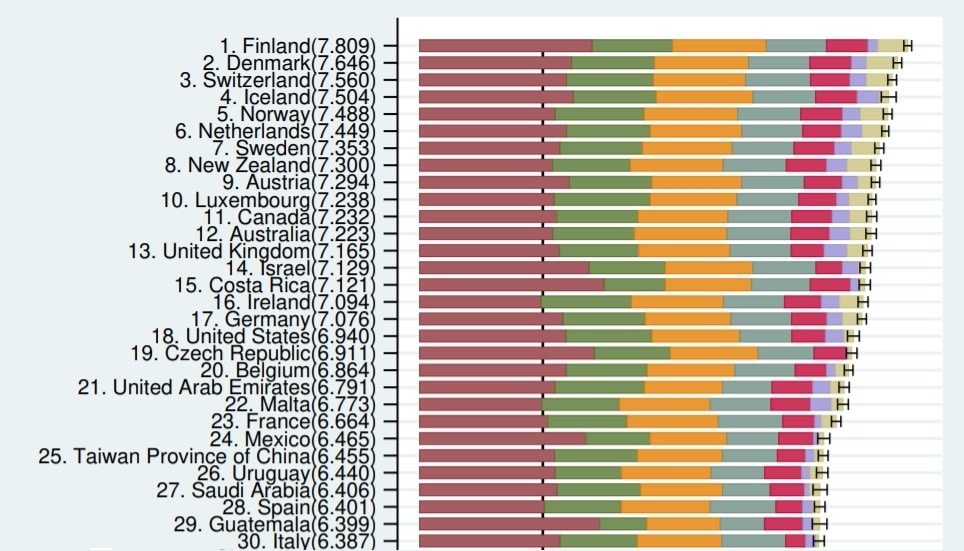
The World Happiness Report measures a country’s happiness by asking people a similar question. On average, people from the United Kingdom gave their happiness a rating of 7.165.
Most of the readers on Tracking Happiness are from the United States, which is the 18th happiest country with an average of 6.940.
Is happiness controllable?
Happiness is one of the most important things in life.
It only makes sense that we would want to control it as much as possible.
But can we?
This topic was part of our survey. We asked participants the following question.
Is happiness something that you can control?
We can’t control 100% of our happiness. However, we can at least aim to understand 100% of our happiness.
The entire premise of Tracking Happiness is to help you understand 100% of your happiness, so that you can take action and actually become happier.
So it makes sense that the participants of this survey acknowledged that happiness can be controlled.
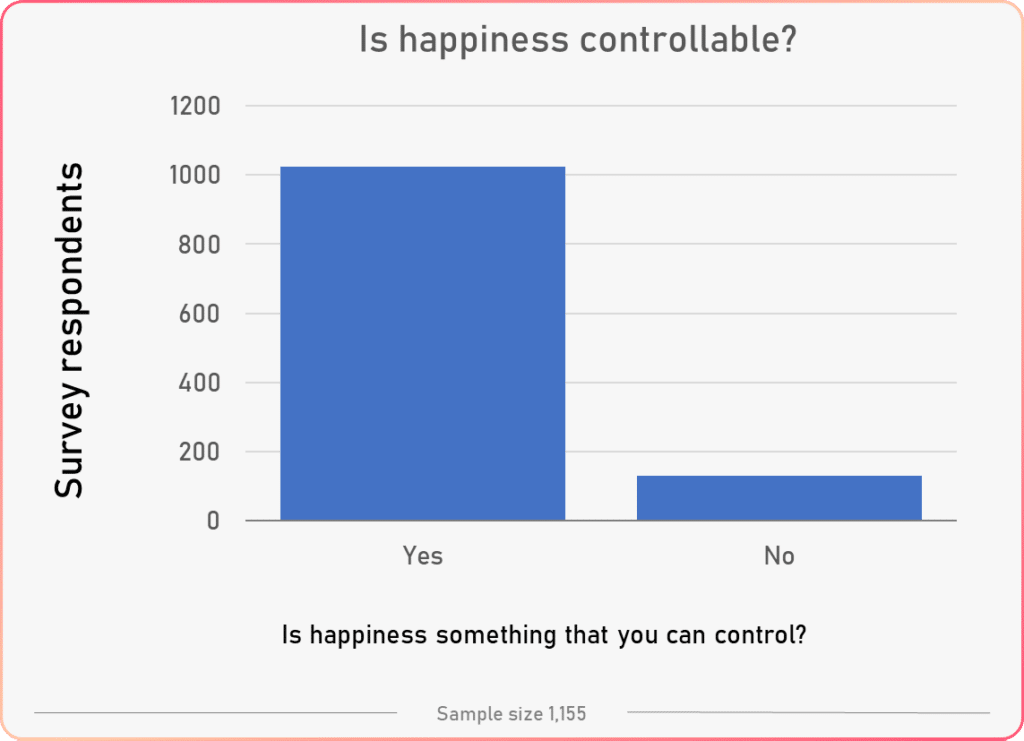
The vast majority of the participants thinks that happiness is something we can control.
Or in other words, 89% of the participants think that we can influence our own happiness.
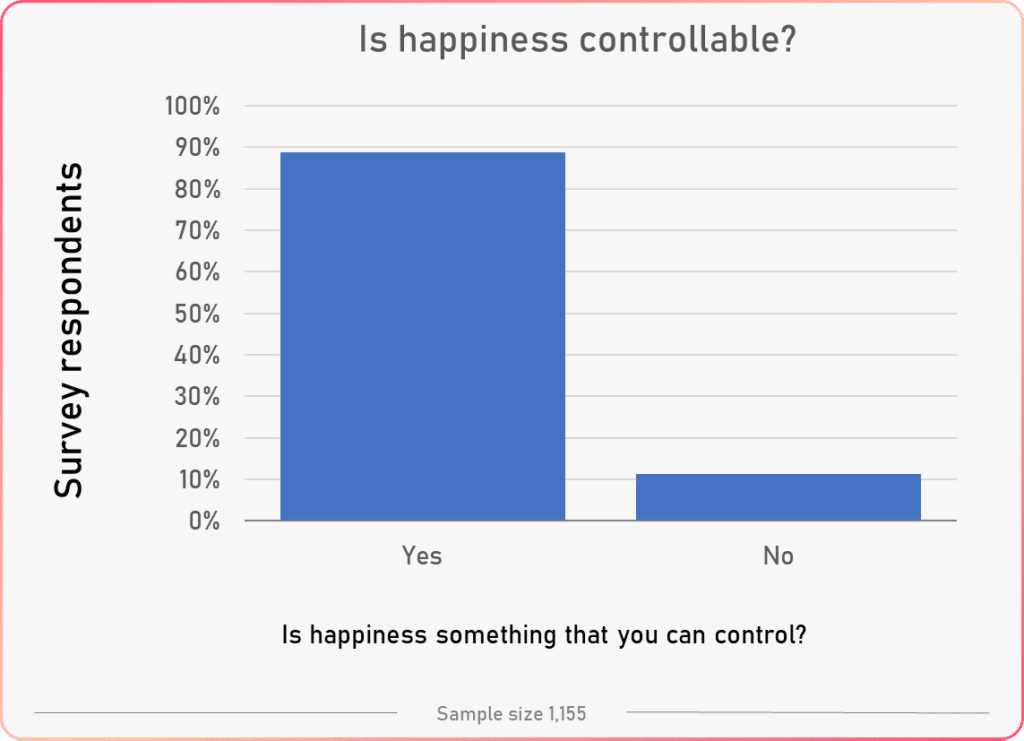
How does this compare to the average human being?
We don’t know. It’s hard to imagine, but there are no previous survey results similar to this one.
Does this mean that we can control 89% of our happiness on average?
No.
But our survey shows some insightful results that can shed light on this question. This result – and many more observations – are shared in seperate articles.
Seperate articles on the study results
This section contains a growing list of articles of specific observations, analyses and conclusions from our study.
- Is happiness controllable?
- How much of our happiness is determined by our state of mind?
- How much of our happiness is circumstantial?
- How much of our happiness is genetic?
- What factors determine our happiness?
- How differently is sex associated with happiness between men and women?
- What words are most associated with happiness?
- How is happiness understood in other countries (to be released soon)
- More to be determined
Each of these articles contain original study results, charts and infographics with new insights.
Who was surveyed?
We used our existing audience to conduct a survey. Our How To Be Happy blog attracts thousands of readers every month, who sign up to become subscribers.
As discussed, the premise of Tracking Happiness is to understand 100% of our happiness, so that we can take action and actually become happier.
In that sense, the survey participants might not be representative for the rest of the world. This has to be said, even though the large amount of participants is varied and diverse.
As part of the study, the key demographics of our participants was surveyed. Here is a small sample of the results we collected.
Gender
We asked our participants the following question:
What gender do you identify as?
And found the following answers.
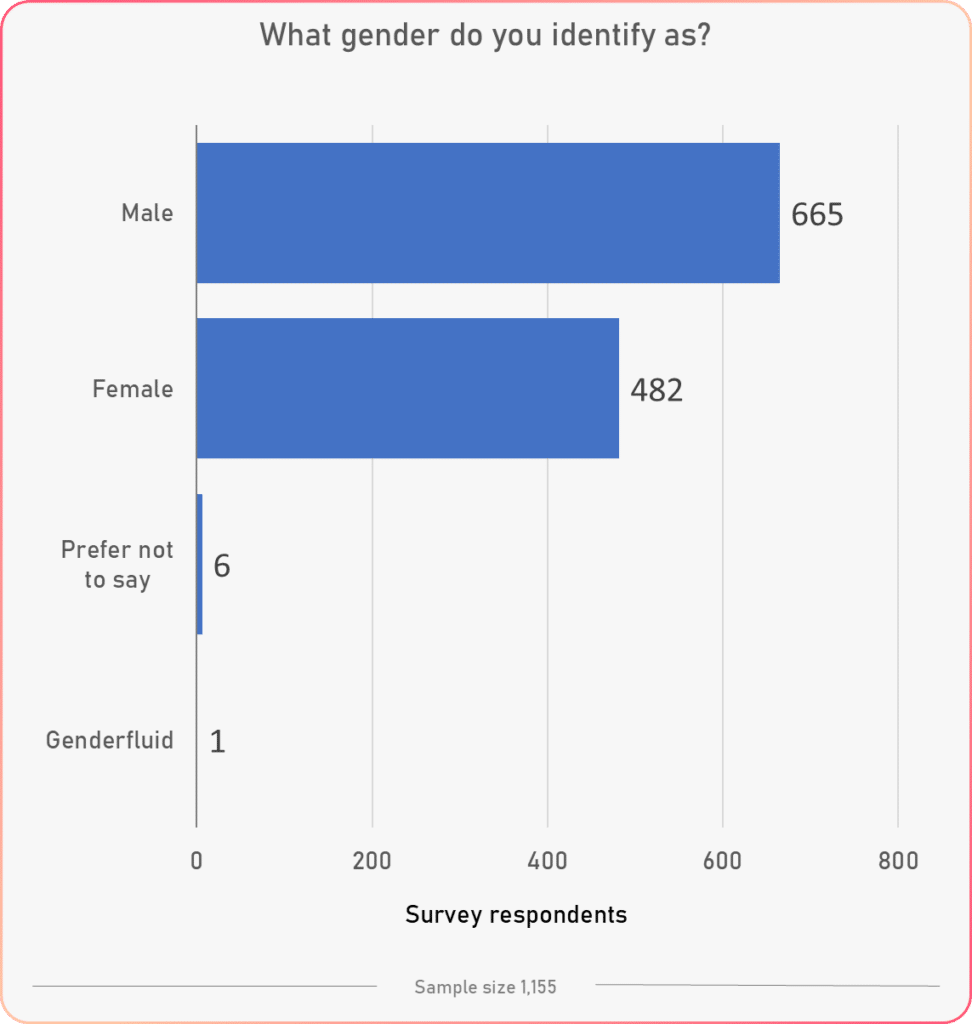
Age
We also asked their approximate age.
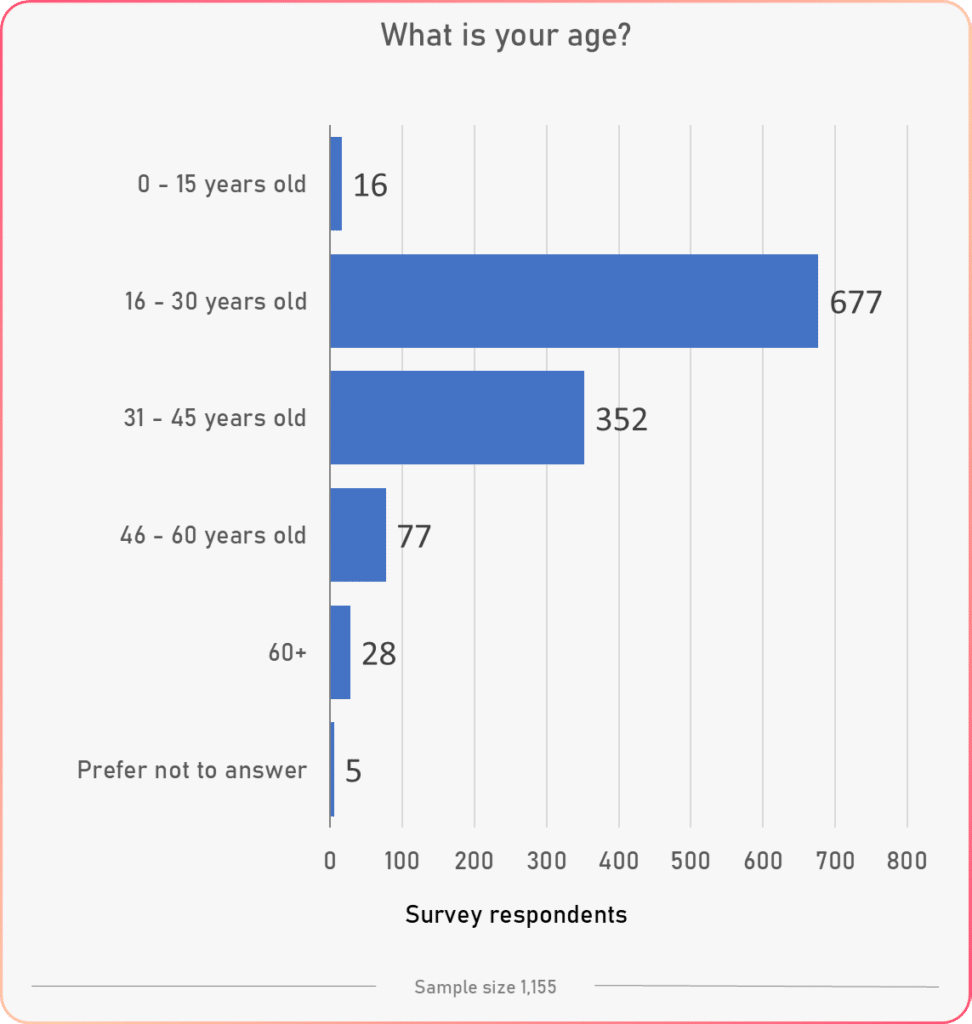
Our survey included other key demographs as well, like employment status, ethnicity and marital status.
If you’d like to see a statistical overview of the demographic data, here’s a link to it:
How was the survey conducted?
We used our existing audience to conduct a survey, by sending out an email to all of our subscribers.
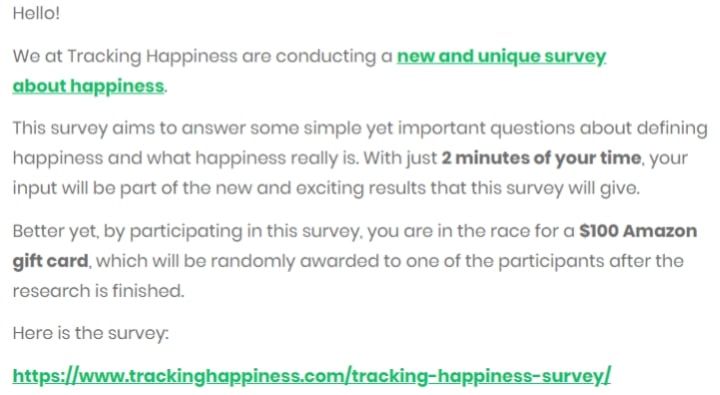
In addition, the survey was shared across social media and additional email campaigns, to attract a large and diverse number of respondents.
In total, 1,155 responses were recorded, from 23 December 2019 to 19 June 2020.
The survey responses are anonymized. No names were collected, and email addresses have only been used to award the winner of the $100 Amazon gift card.
This was obviously needed for us to assign a lucky random winner, which we contacted recently for the award!

Survey questions and multiple choice answers
The file below contains a global summary of the survey, including an export of the questions that the participants had to answer.
If you want to be part of the next Tracking Happiness survey, then become a subscriber and join our community of happiness trackers. You can use the form below to sign up!
💡 By the way: If you want to start feeling better and more productive, I’ve condensed the information of 100’s of our articles into a 10-step mental health cheat sheet here. 👇
This Cheat Sheet Will Help You Be Happier and More Productive
Thrive under stress and crush your goals with these 10 unique tips for your mental health.
A big thank you to everyone who filled in this survey. It has been wildly interesting to analyze your responses. I hope this series of study results and observations gives you more insight into what makes your happiness unique.
You can become happier too, if only you start to understand what happiness really means to you.

